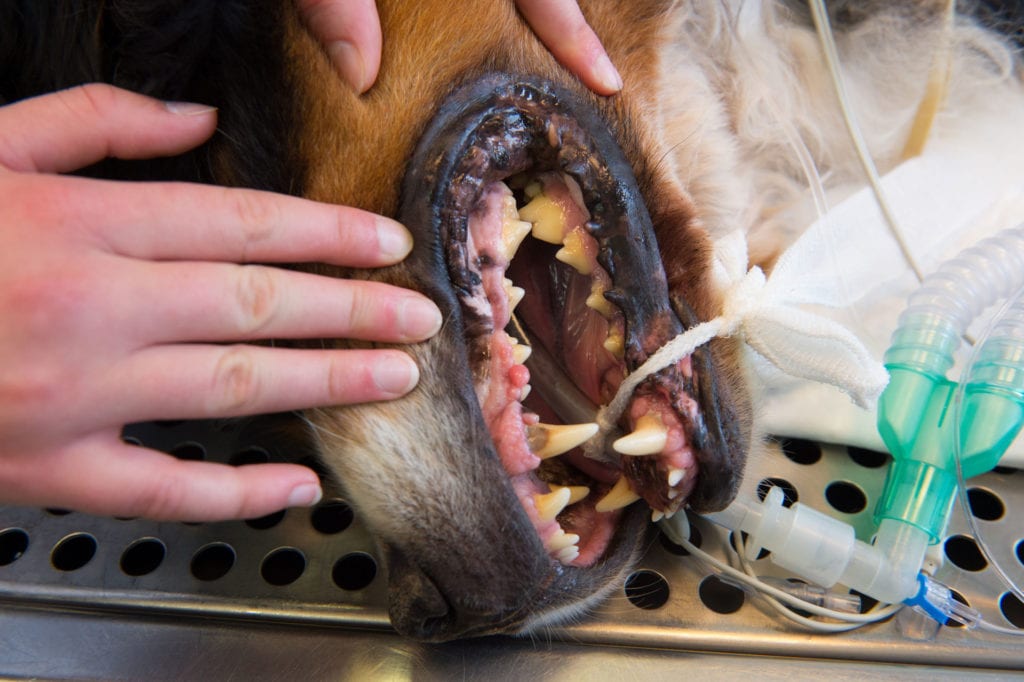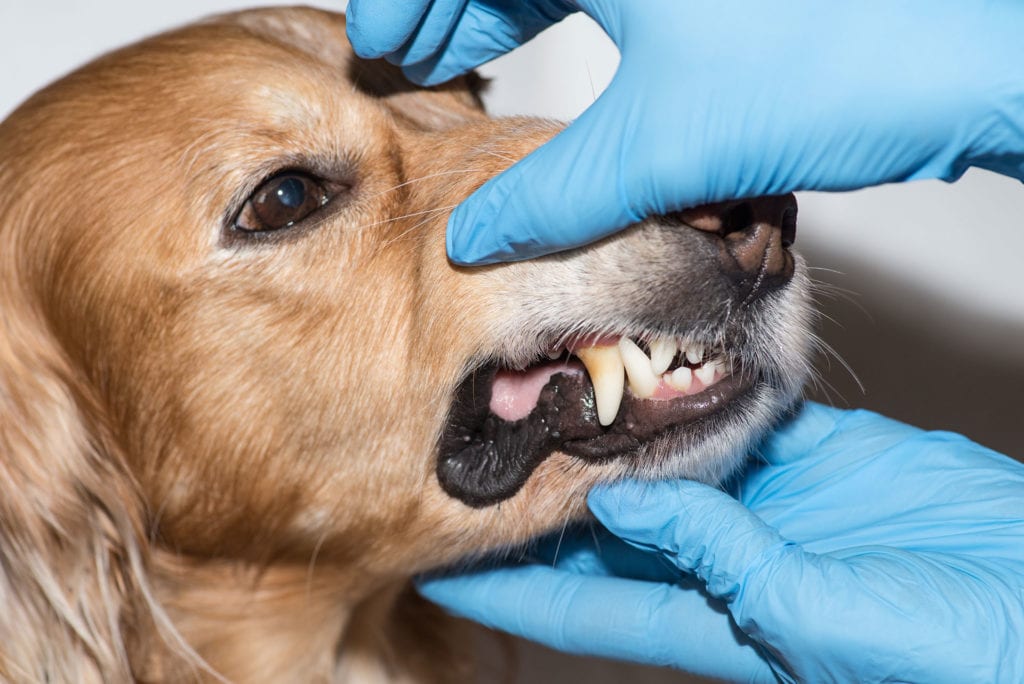Yes! Much like us, regular dental care is a vital component of having a healthy immune system. Most dog owners never take a good look inside their dog’s mouth. And that’s unfortunate because it is estimated that over 80 percent have significant oral pathology (periodontal disease). Periodontal disease in dogs is an inflammation or infection that results in the weakening or loss of support structures of the teeth. Periodontal disease happens when food and bacteria accumulate along the gums and form plaque, which turns into calculus (also known as tartar). Loose teeth, sore and infected gums, and rotting tooth sockets are common findings of periodontal disease that have gone completely unaware to the owners. Many pets may be suffering from dental problems, but without routine dental check ups, these can go unnoticed and escalate into larger health issues, or turn into very costly dental procedures.

Why is Oral Hygiene for my pets important?
Dental health is an important, but often overlooked, aspect of pet well-being. Poor dental health is painful and can dramatically affect a pet’s quality of life. Furthermore, bacteria from the mouth can travel to distant organs such as the heart and kidneys to cause further trouble. Preventing dental problems with regular teeth cleanings, and treating painful teeth when they develop, can vastly improve a pet’s overall health.
When should I start taking my pet for cleanings?
It should not be surprising that dental health requires periodical professional cleaning regardless of whether the mouth in question belongs to a person, a dog, a cat, a horse, or some other animal. Home care of the tooth is never perfect, and periodically tartar must be properly removed and the tooth surface properly polished and disinfected. The professional cleaning performed at the veterinarian’s office is similar to what a person receives at their dentist’s office: Many of our pets will start to show signs of periodontal disease by the age of 3. Periodontal disease develops as the bacteria in plaque (the white sticky stuff that forms on teeth) causes gingivitis, which is inflammation of the gum tissue (think of bleeding gums when you brush or floss). Early gingivitis is reversible, but if periodontal disease is allowed to progress, there can be permanent loss of gum and bone tissue that surround the tooth roots.
* Note that small and flat-faced dog breeds are at greater risk of dental problems due to crowding of their teeth into smaller, less “wolf-like” mouths. Veterinary dentists have a saying—if your dog is smaller than a bread box, it should begin prophylactic dental cleanings very early in life (sometimes as young as 1-2 years of age).
Common Signs of Dental Problems
Here are some of the common signs of gum disease that may eventually lead to advanced periodontal disease if the condition goes without treatment.
- Bleeding or red gums (or signs of blood on chew toys or in food and water bowls)
- Signs of irritation in the mouth
- Loss of appetite
- Difficulty eating
- Excessive drooling
- Irritability
- Loose teeth or, at advanced stages, teeth falling out
- Bad breath
Do cats need regular professional teeth cleaning too?
Yes! Cats are different creatures than dogs and often develop something called resorptive lesions. No one knows exactly why cats develop this problem. Resorptive lesions are painful areas that develop near the gum margin on the tooth itself. When teeth are resorbing, the immune system eats away at the tooth until the tooth disappears and bone replaces the root of the tooth. Once bone fully replaces the root of the tooth and the crown (top part) of the tooth is gone, it is typically not painful. However, the process of the tooth getting to this point is extremely painful and can take years to a lifetime to achieve, so prevention or extraction are necessary.
What Can I do to help my pet from getting periodontal disease?
Fortunately, there is a lot we can do to prevent periodontal disease and the rules are basically the same whether the teeth belong to a pet or to a human being: Professional Cleaning and Home Care. Expect your pet to need a professional teeth cleaning every 6-12 months and expect general anesthesia to be necessary for each tooth to receive proper attention and care. Home care is ideally a daily part of tooth maintenance, and even brushing just twice a week can remove most plaque before it can mineralize into tartar. Not every pet is amenable to hands-on oral care and not every person’s schedule is amenable to it either, so there are some lower maintenance options such as proper foods to help plaque reduction, and daily chew toys to fight calculus build up.
What kind of foods are best for oral health?
One of the best ways to insure optimum oral health is to provide the dog with a well-balanced, meat-based dog food. Meat assists in keeping the mouth environment healthy. There are many different toy and dental chewy options, so asking your vet which is the best and safest for your pet, is ideal. Many toys and treats may claim to be “dental” but can cause damage to your pets teeth or digestive tract, so always check with your vet for their recommended safe choices.
**Remember not all “dental” food and chews are safe or created equal. Before changing food, and picking dental chews, it is best to ask your vet for the best choice for your pets breed that will provide optimum results. Like all health related care, prevention and routine check ups are ideal to keep our pets safe and healthy!
For more information on Oral Health and Home Care for your pets: https://veterinarypartner.vin.com/default.aspx?pid=19239&id=4951515


